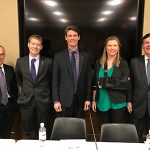The new USP standards, without appropriate exceptions, may also prevent physicians from reconstituting in-office lyophilized preparations purchased from a manufacturer.
“I am a practicing rheumatologist in the largest single-specialty rheumatology group in the U.S., and … in my practice we have been concerned that if we fall under more stringent compounding regulations we would be unable to … provide these services to patients because of the burden of what are essentially rules and processes designed for industrial compounding, not the reconstitution of medications in accordance with FDA labeling that we have all been doing safely for years,” says Dr. Edgerton.
Exclude In-Office Mixing
He and Dr. Adams, along with the ACR, believe USP should exclude in-office mixing from the compounding definition.
“The ACR’s push right now is protect patient access and safety while allowing appropriate in-office treatment,” says. Dr. Edgerton. “In regard to compounding, this [means] excluding activities, such as immediate-use joint and soft-tissue injections, and reconstitution in accordance with FDA labeling, from the definition of compounding.”
Kelly April Tyrrell writes about health, science and health policy. She lives in Madison, Wis.
References
- Committee on Rheumatologic Care. American College of Rheumatology Position Statement. Compounding of Pharmacologic Agents. 2017 Feb.
- Food and Drug Administration. New England Compounding Center pharmacist sentenced for role in nationwide fungal meningitis outbreak. 2018 Jan 31. https://www.fda.gov/ICECI/CriminalInvestigations/ucm594800.htm.
- American College of Rheumatology. Position Statement. Committee on Rheumatologic care. 2017 Feb.

